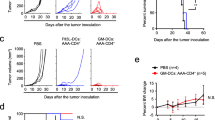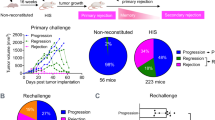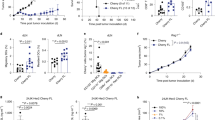Abstract
Adoptive cell transfer (ACT) melanoma immunotherapy typically employs acutely activated effector CD8+ T cells for their ability to rapidly recognize and clear antigen. We have previously observed that effector CD8+ T cells are highly susceptible to melanoma-induced suppression, whereas memory CD8+ T cells are not. Although memory T cells have been presumed to be potentially advantageous for ACT, the kinetics of local and systemic T cell responses after effector and memory ACT have not been compared. B16F10 melanoma cells stably transfected to express very low levels of the lymphocytic choriomeningitis virus (LCMV) peptide GP33 (B16GP33) were inoculated into syngeneic C57BL/6 mice. Equal numbers of bona fide naïve, effector, or memory phenotype GP33-specific CD8+ T cells were adoptively transferred into mice 1 day after B16GP33 inoculation. The efficacy of ACT immunotherapy was kinetically assessed using serial tumor measurements and flow cytometric analyses of local and systemic CD8+ T cell responses. Control of B16GP33 tumor growth, persistence of adoptively transferred CD8+ cells, intratumoral infiltration of CD8+ T cells, and systemic CD8+ T cell responsiveness to GP33 were strongest after ACT of memory CD8+ T cells. Following surgical tumor resection and melanoma tumor challenge, only mice receiving memory T cell-based ACT immunotherapy exhibited durable tumor-specific immunity. These findings demonstrate how the use of non-expanded memory CD8+ T cells may enhance ACT immunotherapeutic efficacy.






Similar content being viewed by others
Abbreviations
- ACT:
-
Adoptive cell transfer
- LCMV:
-
Lymphocytic choriomeningitis virus
References
Rosenberg SA, Yannelli JR, Yang JC, Topalian SL, Schwartzentruber DJ, Weber JS, Parkinson DR, Seipp CA, Einhorn JH, White DE (1994) Treatment of patients with metastatic melanoma with autologous tumor-infiltrating lymphocytes and interleukin 2. J Natl Cancer Inst 86:1159–1166
Rosenberg SA, Dudley ME (2009) Adoptive cell therapy for the treatment of patients with metastatic melanoma. Curr Opin Immunol 21:233–240
Rosenberg SA, Yang JC, Sherry RM, Kammula UW, Hughes MS, Phan GQ, Citrin DE, Restifo NP, Robbins PF, Wunderlich JR, Morton KE, Laurencot CM, Steinberg SM, White DE, Dudley ME (2011) Durable complete responses in heavily pretreated patients with metastatic melanoma using T-cell transfer immunotherapy. Clin Cancer Res 17:4550–4557
Dudley ME, Wunderlich JR, Yang JC, Sherry RM, Topalian SL, Restifo NP, Royal RE, Kammula U, White DE, Mavroukakis SA, Rogers LJ, Gracia GJ, Jones SA, Mangiameli DP, Pelletier MM, Gea-Banacloche J, Robinson MR, Berman DM, Filie AC, Abati A, Rosenberg SA (2005) Adoptive cell transfer therapy following non-myeloablative but lymphodepleting chemotherapy for the treatment of patients with refractory metastatic melanoma. J Clin Oncol 23:2346–2357
Klebanoff CA, Khong HT, Antony PA, Palmer DC, Restifo NP (2005) Sinks, suppressors and antigen presenters: how lymphodepletion enhances T cell-mediated tumor immunotherapy. Trends Immunol 26:111–117
Yee C (2014) The use of endogenous T cells for adoptive transfer. Immunol Rev 257:250–263
Murali-Krishna K, Altman JD, Suresh M, Sourdive DJ, Zajac AJ, Miller JD, Slansky J, Ahmed R (1998) Counting antigen-specific CD8 T cells: a reevaluation of bystander activation during viral infection. Immunity 8:177–187
Kaech SM, Wherry EJ, Ahmed R (2002) Effector and memory T-cell differentiation: implications for vaccine development. Nat Rev Immunol 2:251–262
Wherry EJ, Teichgräber V, Becker TC, Masopust D, Kaech SM, Antia R, von Andrian UH, Ahmed R (2003) Lineage relationship and protective immunity of memory CD8 T cell subsets. Nat Immunol 4:225–234
Sarkar S, Teichgräber V, Kalia V, Polley A, Masopust D, Harrington LE, Ahmed R, Wherry EJ (2007) Strength of stimulus and clonal competition impact the rate of memory CD8 T cell differentiation. J Immunol 179:6704–6714
Joshi NS, Cui W, Chandele A, Lee HK, Urso DR, Hagman J, Gapin L, Kaech SM (2007) Inflammation directs memory precursor and short-lived effector CD8(+) T cell fates via the graded expression of T-bet transcription factor. Immunity 27:281–295
Zimmermann C, Prevost-Blondel A, Blaser C, Pircher H (1999) Kinetics of the response of naïve and memory CD8 T cells to antigen: similarities and differences. Eur J Immunol 29:284–290
Gattinoni L, Klebanoff CA, Palmer DC, Wrzesinski C, Kerstann K, Yu Z, Finkelstein SE, Theoret MR, Rosenberg SA, Restifo NP (2005) Acquisition of full effector function in vitro paradoxically impairs the in vivo antitumor efficacy of adoptively transferred CD8+ T cells. J Clin Invest 115:1616–1626
Klebanoff CA, Gattinoni L, Tradbi-Parizi P, Kerstann K, Cardones AR, Finkelstein SE, Palmer DC, Antony PA, Hwang ST, Rosenberg SA, Waldmann TA, Restifo NP (2005) Central memory self/tumor-reactive CD8+ T cells confer superior antitumor immunity compared with effector memory T cells. Proc Natl Acad Sci USA 102:9571–9576
Hinrichs CS, Borman ZA, Cassard L, Gattinoni L, Spolski R, Yu Z, Sanchez-Perez L, Muranski P, Kern SJ, Logun C, Palmer DC, Ji Y, Reger RN, Leonard WJ, Danner RL, Rosenberg SA, Restifo NP (2009) Adoptively transferred effector cells derived from naïve rather than central memory CD8+ T cells mediated superior antitumor immunity. Proc Natl Acad Sci USA 106:17469–17474
Hinrichs CS, Borman ZA, Gattinoni L, Yu Z, Burns WR, Huang J, Klebanoff CA, Johnson LA, Kerkar SP, Yang S, Muranski P, Palmer DC, Scott CD, Morgan RA, Robbins PF, Rosenberg SA, Restifo NP (2011) Human effector CD8+ T cells derived from naïve rather than memory subsets possess superior traits for adoptive immunotherapy. Blood 117:808–814
Klebanoff CA, Gattinoni L, Palmer DC, Muranski P, Ji Y, Hinrichs CS, Borman ZA, Kerkar SP, Scott CD, Finkelstein SE, Rosenberg SA, Restifo NP (2011) Determinants of successful CD8+ T-cell adoptive immunotherapy for large established tumors in mice. Clin Cancer Res 17:5343–5352
Klebanoff CA, Gattinoni L, Restifo NP (2012) Sorting through subsets: which T-cell populations mediate highly effective adoptive immunotherapy? J Immunother 35:651–660
Crompton JG, Sukumar M, Restifo NP (2014) Uncoupling T-cell expansion from effector differentiation in cell-based immunotherapy. Immunol Rev 257:264–276
Russ AJ, Wentworth L, Xu K, Seroogy CM, Rakhmilevich A, Sondel PM, Suresh M, Cho CS (2011) Suppression of T-cell expansion by melanoma is exerted on resting cells. Ann Surg Oncol 18:3848–3857
Russ AJ, Xu K, Wentworth L, Alam S, Meyers JV, Macklin MD, Rakhmilevich AL, Suresh M, Cho CS (2011) Melanoma-induced suppression of tumor antigen-specific T cell expansion is comparable to suppression of global T cell expansion. Cell Immunol 271:104–109
Wentworth L, Meyers JV, Alam S, Russ AJ, Suresh M, Cho CS (2013) Memory T cells are uniquely resistant to melanoma-induced suppression. Cancer Immunol Immunother 62:149–159
Mahvi DA, Meyers JV, Tatar AJ, Contreras A, Suresh M, Leverson GE, Sen S, Cho CS (2015) CTLA-4 blockade plus adoptive T cell transfer promotes optimal melanoma immunity in mice. J Immunother 38:54–61
Hodi FS, O’Day SJ, McDermott DF, Weber RW, Sosman JA, Haanen JB, Gonzalez R, Robert C, Schadendorf D, Hassel JC, Akerley W, van den Eertwegh AJ, Lutzky J, Lorigan P, Vaubel JM, Linette GP, Hogg D, Ottensmeier CH, Lebbé C, Peschel C, Quirt I, Clark JI, Wolchok JD, Weber JS, Tian J, Yellin MJ, Nichol GM, Hoos A, Urba WJ (2010) Improved survival with ipilimumab in patients with metastatic melanoma. N Engl J Med 363:711–723
Prieto PA, Yang JC, Sherry RM, Hughes MS, Kammula US, White DE, Levy CL, Rosenberg SA, Phan GQ (2012) CTLA-4 blockade with ipilimumab: long-term follow-up of 177 patients with metastatic melanoma. Clin Cancer Res 18:2039–2047
Topalian SL, Sznol M, McDermott DF, Kluger HM, Carvajal RD, Sharfman WH, Brahmer JR, Lawrence DP, Atkins MB, Powderly JD, Leming PD, Lipson EJ, Puzanov I, Smith DC, Taube JM, Wigginton JM, Kollia GD, Gupta A, Pardoll DM, Sosman JA, Hodi FS (2014) Survival, durable tumor remission, and long-term safety in patients with advanced melanoma receiving nivolumab. J Clin Oncol 32:1020–1030
Hamid O, Robert C, Daud A, Hodi FS, Hwu WJ, Kefford R, Wolchok JD, Hersey P, Joseph RW, Weber JS, Dronca R, Gangadhar TC, Patnaik A, Zarour H, Joshua AM, Gergich K, Elassaiss-Schaap J, Algazi A, Mateus C, Boasberg P, Tumeh PC, Chmielowski B, Ebbinghaus SW, Li XN, Kang SP, Ribas A (2013) Safety and tumor responses with lambrolizumab (anti-PD-1) in melanoma. N Engl J Med 369:134–144
Wolchok JD, Kluger H, Callahan MK, Postow MA, Rizvi NA, Lesokhin AM, Segal NH, Ariyan CE, Gordon RA, Reed K, Burke MM, Caldwell A, Kronenberg SA, Agunwamba BU, Zhang X, Lowy I, Inzunza HD, Feely W, Horak CE, Hong Q, Korman AJ, Wigginton JM, Gupta A, Sznol M (2013) Nivolumab plus ipilimumab in advanced melanoma. N Engl J Med 369:122–133
Couzin-Frankel J (2013) Breakthrough of the year 2013: cancer immunotherapy. Science 342:1432–1433
Weber JS, Dummer R, de Pril V, Lebbé C, Hodi FS, MDX010-20 Investigators (2013) Patterns of onset and resolution of immune-related adverse events of special interest with ipilimumab: detailed safety analysis from a phase 3 trial in patients with advanced melanoma. Cancer 119:1675–1682
Fecher LA, Agarwala SS, Hodi FS, Weber JS (2013) Ipilimumab and its toxicities: a multidisciplinary approach. Oncologist 18:733–743
Roberts AD, Ely KH, Woodland DL (2005) Differential contributions of central and effector memory T cells to recall responses. J Exp Med 202:123–133
Fiorenza S, Kenna TJ, Comerford I, McColl S, Steptoe RJ, Leggatt GR, Frazer IH (2012) A combination of local inflammation and central memory T cells potentiates immunotherapy in the skin. J Immunol 189:5622–5631
Yang S, Gattinoni L, Liu F, Ji Y, Yu Z, Restifo NP, Rosenberg SA, Morgan RA (2011) In vitro generated anti-tumor T lymphocytes exhibit distinct subsets mimicking in vivo antigen experienced cells. Cancer Immunol Immunother 60:739–749
Pages F, Kirilovsky A, Mlecnik B, Asslaber M, Tosolini M, Bindea G, Lagorce C, Wind P, Marliot F, Bruneval P, Zatloukal K, Trajanoski Z, Berger A, Fridman WH, Galon J (2009) In situ cytotoxic and memory T cells predict outcome in patients with early-stage colorectal cancer. J Clin Oncol 27:5944–5951
Hotta K, Sho M, Fujimoto K, Shimada K, Yamato I, Anai S, Konishi N, Hirao Y, Nonomura K, Nakajima Y (2011) Prognostic significance of CD45RO + memory T cells in renal cell carcinoma. Br J Cancer 105:1191–1196
Cariani E, Pilli M, Zerbini A, Rota C, Olivani A, Pelosi G, Schianchi C, Soliani P, Campanini N, Silini EM, Trenti T, Ferrari C, Missale G (2012) Immunological and molecular correlates of disease recurrence after liver resection for hepatocellular carcinoma. PLoS One 7:e32493
Enomoto K, Sho M, Wakatsuki K, Takayama T, Matsumoto S, Nakamura S, Akahori T, Tanaka T, Migita K, Ito M, Nakajima Y (2012) Prognostic importance of tumor-infiltrating memory T cells in oesophageal squamous cell carcinoma. Clin Exp Immunol 168:186–191
Webb JR, Milne K, Watson K, Deleeuw RJ, Nelson BH (2014) Tumor-infiltrating lymphocytes expressing the tissue resident memory marker CD103 are associated with increased survival in high-grade serous ovarian cancer. Clin Cancer Res 20:434–444
Galon J, Costes A, Sanchez-Cabo F, Kirilovsky A, Mlecnik B, Lagorce-Pagès C, Tosolini M, Camus M, Berger A, Wind P, Zinzindohoué F, Bruneval P, Cugnenc PH, Trajanoski Z, Fridman WH, Pagès F (2006) Type, density and location of immune cells within human colorectal tumors predict clinical outcome. Science 313:1960–1964
Klebanoff CA, Finkelstein SE, Surman DR, Lichtman MK, Gattinoni L, Theoret MR, Grewal N, Spiess PJ, Antony PA, Palmer DC, Tagaya Y, Rosenberg SA, Waldmann TA, Restifo NP (2004) IL-15 enhances the in vivo antitumor activity of tumor-reactive CD8+ T cells. Proc Natl Acad Sci USA 101:1969–1974
Le HK, Graham L, Miller CH, Kmieciak M, Manjili MH, Bear HD (2009) Incubation of antigen-sensitized T lymphocytes activated with bryostatin 1 + ionomycin in IL-7 + IL-15 increases yield of cells capable of inducing regression of melanoma metastases compared to culture in IL-2. Cancer Immunol Immunother 58:1565–1576
Huarte E, Fisher J, Turk MJ, Mellinger D, Foster C, Wolf B, Meehan KR, Fadul CE, Ernstoff MS (2009) Ex vivo expansion of tumor specific lymphocytes with IL-15 and IL-21 for adoptive immunotherapy in melanoma. Cancer Lett 285:80–88
Cha E, Graham L, Manjili MH, Bear HD (2010) IL-7 + IL-15 are superior to IL-2 for the ex vivo expansion of 4T1 mammary carcinoma-specific T cells with greater efficacy against tumors in vivo. Breast Cancer Res Treat 122:359–369
Yang S, Dudley ME, Rosenberg SA, Morgan RA (2010) A simplified method for the clinical-scale generation of central memory-like CD8+ T cells after transduction with lentiviral vectors encoding antitumor antigen T-cell receptors. J Immunother 33:648–658
Pouw N, Treffers-Westerlaken E, Kraan J, Wittink F, ten Hagen T, Verweij J, Debets R (2010) Combination of IL-21 and IL-15 enhances tumor-specific cytotoxicity and cytokine production of TCR-transduced primary T cells. Cancer Immunol Immunother 59:921–931
Sukumar M, Liu J, Ji Y, Subramanian M, Crompton JG, Yu Z, Roychoudhuri R, Palmer DC, Muranski P, Karoly ED, Mohney RP, Klebanoff CA, Lal A, Finkel T, Restifo NP, Gattinoni L (2013) Inhibiting glycolytic metabolism enhances CD8+ T cell memory and anti-tumor function. J Clin Invest 123:4479–4488
Kaiser AD, Gadiot J, Guislain A, Blank CU (2013) Mimicking homeostatic proliferation in vitro generates T cells with high anti-tumor function in non-lymphopenic hosts. Cancer Immunol Immunother 62:503–515
Litterman AJ, Zellmer DM, LaRue RS, Jameson SC, Largaespada DA (2014) Antigen-specific culture of memory-like CD8 T cells for adoptive immunotherapy. Cancer Immunol Res 2:839–845
Zoon CK, Seitelman E, Keller S, Graham L, Blevins TL, Dumur CI, Bear HD (2014) Expansion of melanoma-specific lymphocytes in alternative gamma chain cytokines: gene expression variances between T cells and T-cell subsets exposed to IL-2 versus IL-7/15. Cancer Gene Ther 21:441–447
Acknowledgments
This work was funded by the Department of Veterans Affairs, Veterans Health Administration, Office of Research and Development, Biomedical Science Research and Development Service, CDA-2 and Merit Review Award (1I01BX001619-01A1) (Cho), by the generous support of Ronald and Patricia A Kissinger (Cho), University of Wisconsin Cellular and Molecular Pathology Training Program and National Institutes of Health (NIH) Grant T32 GM081061 (Contreras), and NIH Grant AI48785 (Suresh). The content is solely the responsibility of the authors and does not represent the views of the Department of Veterans Affairs or the United States Government or the National Institutes of Health.
Author information
Authors and Affiliations
Corresponding author
Ethics declarations
Conflict of interest
All authors have declared that there are no financial conflicts of interest with regard to this work.
Rights and permissions
About this article
Cite this article
Contreras, A., Sen, S., Tatar, A.J. et al. Enhanced local and systemic anti-melanoma CD8+ T cell responses after memory T cell-based adoptive immunotherapy in mice. Cancer Immunol Immunother 65, 601–611 (2016). https://doi.org/10.1007/s00262-016-1823-8
Received:
Accepted:
Published:
Issue Date:
DOI: https://doi.org/10.1007/s00262-016-1823-8




